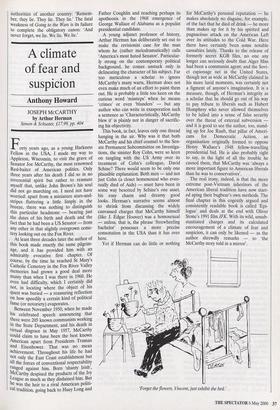A climate of fear and suspicion
Anthony Howard
JOSEPH McCARTHY by Arthur Herman Simon & Schuster, £17.99, pp. 404 Forty years ago, as a young Harkness Fellow in the USA, I made my way to Appleton, Wisconsin, to visit the grave of Senator Joe McCarthy, the most renowned Red-baiter of American politics. Only three years after his death I did so in no reverential spirit but rather to reassure myself that, unlike John Brown's his soul did not go marching on. I need not have worried: apart from a miniature stars-and- stripes fluttering a little limply in the breeze, there was nothing to distinguish this particular headstone — bearing just the dates of his birth and death and the fact that he had been a US Senator — from any other in that slightly overgrown ceme- tery looking out on the Fox River. At least three decades later the author of this book made exactly the same pilgrim- age, and it has provided him with an admirably evocative first chapter. Of course, by the time he reached St Mary's Catholic Cemetery in the Fox River Valley memories had grown a good deal more musty than when I was there in 1960. He even had difficulty, which I certainly did not, in locating where the object of his quest was buried — a reassuring reflection on how speedily a certain kind of political fame (or notoriety) evaporates. Between November 1950, when he made his celebrated speech announcing that there were 205 known communists working in the State Department, and his death in virtual disgrace in May 1957, McCarthy could claim to have been the best known American apart from Presidents Truman and Eisenhower. That was no mean achievement. Throughout his life he had not only the East. Coast establishment but all the forces of conventional respectability ranged against him. Born 'shanty Irish', McCarthy despised the products of the Ivy he as much as they disdained him. But ne was the heir to a rival American politi- cal tradition, going back to Huey Long and Father Coughlin and reaching perhaps its apotheosis in the 1968 emergence of George Wallace of Alabama as a populist presidential candidate.
A young adjunct professor of history, Arthur Herman has deliberately set out to make the revisionist case for the man whom he (rather melodramatically) calls `America's most hated Senator'. Particular- ly strong on the contemporary political background, he comes unstuck only in delineating the character of his subject. Far too meticulous a scholar to ignore McCarthy's many warts, Herman does not even make much of an effort to paint them out. He is probably a little too keen on the curious word 'missteps' when he means `crimes' or even 'blunders' — but any author who can write in exasperation such a sentence as 'Characteristically, McCarthy blew it' is plainly not in danger of sacrific- ing his objectivity.
This book, in fact, leaves only one thread hanging in the air. Why was it that both McCarthy and his chief counsel to the Sen- ate Permanent Subcommittee on Investiga- tions, the sinister Roy Cohn, were so keen on tangling with the US Army over its treatment of Cohn's colleague, David Schine? There would seem to be only one plausible explanation. Both men — and not just Cohn (a closet homosexual who even- tually died of Aids) — must have been in some way besotted by Schine's one asset, his easy charm and dreamy good looks. Herman's narrative seems almost to shrink from discussing the widely canvassed charges that McCarthy himself (like J. Edgar Hoover) was a homosexual — unless, that is, the phrase 'freewheeling bachelor' possesses a more precise connotation in the USA than it has over here.
Yet if Herman can do little or nothing for McCarthy's personal reputation — he makes absolutely no disguise, for example, of the fact that he died of drink — he more than makes up for it by his spirited and pugnacious attack on the American Left over its attitudes to the Cold War. Here there have certainly been some notable casualties lately. Thanks to the release of formerly secret KGB files, no one any longer can seriously doubt that Alger Hiss had been a communist agent; and the Sovi- et espionage net in the United States, though not as wide as McCarthy claimed in his more lurid moments, was certainly not a figment of anyone's imagination. It is a measure, though, of Herman's integrity as a scholar that he should go out of his way to pay tribute to liberals such as Hubert Humphrey who never allowed themselves to be lulled into a sense of false security over the threat of external subversion and it is good to see the author, too, stand- ing up for Joe Rauh, that pillar of Ameri- cans for Democratic Action, an organisation originally formed to oppose Henry Wallace's 1948 fellow-travelling presidential bid. He is also probably right to say, in the light of all the trouble he caused them, that McCarthy was 'always a more important figure to American liberals than he was to conservatives'.
The real irony, indeed, is that the more extreme post-Vietnam inheritors of the American liberal tradition have now start- ed aping their bugbear's own methods. The final chapter in this cogently argued and consistently readable book is called 'Epi- logue' and deals at the end with Oliver Stone's 1991 film JFK. With its wild, unsub- stantiated charges and its calculated encouragement of a climate of fear and suspicion, it can only be likened — as the author shrewdly remarks — to 'the McCarthy story told in a mirror'.
Forget the flowers, Vincent, just exhibit the bed.'


































































 Previous page
Previous page